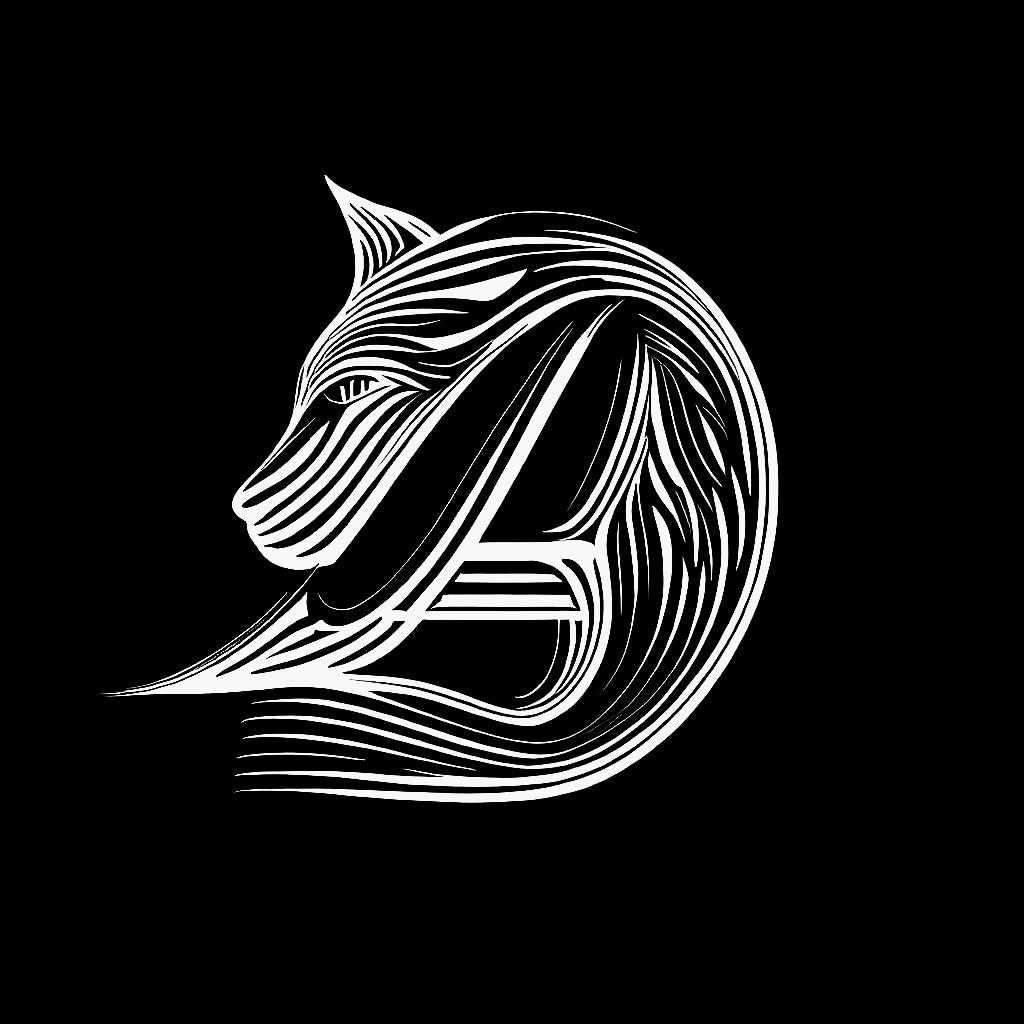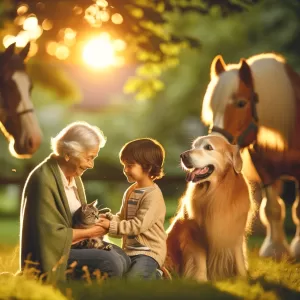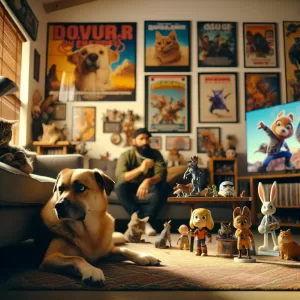PIn the grand theater of human existence, happiness has played a leading role in the narrative of our lives. It’s the elusive protagonist that we continually chase, hoping to grasp its essence and make it a permanent part of our story. Yet, this pursuit is not one-size-fits-all – it is as diverse and varied as the cultures that shape our world. The concept of happiness, a subjective construct in itself, takes on different hues across the canvas of human societies. From the individualistic triumphs in the West to the harmony-laden Eastern philosophies, from the warm coziness of Danish ‘hygge’ to the community-centric African Ubuntu, happiness unfurls its spectrum in fascinating ways.
Amidst this vibrant array of perspectives, there exists a universal source of joy, a common denominator of delight that is oblivious to geographical boundaries and cultural differentiations – our pets. The wagging tail of a dog, the rhythmic purr of a cat, or the chirpy tunes of a pet bird, they all speak the universal language of happiness. As we delve into the exploration of cultural happiness and how our pets help us tune into it, we unravel the tapestry of shared emotions and experiences that bind us all.
The Cultural Rainbow of Happiness
To appreciate the role our pets play in our happiness, we must first understand the cultural context of joy. Happiness is a complex emotion, influenced by a myriad of factors, including our social, economic, and cultural environments.
In Western societies, where individualism is often celebrated, happiness is frequently tied to personal achievement and success. The ‘American Dream,’ for instance, epitomizes this concept of happiness – the idea that anyone, regardless of their background, can find happiness through hard work and determination. This narrative of ‘rags to riches’ serves as a beacon of hope, promising the attainment of happiness through personal accomplishments.
Eastern philosophies, however, paint a different picture. In cultures influenced by Buddhist, Taoist, and Confucian teachings, happiness is more about inner peace, harmony, and balance. It’s about being content with what you have and finding joy in simplicity. The pursuit of happiness is not a personal journey but a collective endeavor, emphasizing relationships and social harmony.
Venturing towards Northern Europe, we encounter a unique concept of happiness – ‘hygge’. This Danish philosophy doesn’t have a direct translation in English, but it encapsulates the idea of creating a warm atmosphere, enjoying the good things in life with good people. It’s about appreciating the simple pleasures, like a cup of hot cocoa by the fire or a cozy evening spent with loved ones.
Traveling further south, we come across the African philosophy of Ubuntu, which essentially means ‘I am because we are.’ It’s a philosophy that emphasizes communal interdependence, asserting that our happiness is intrinsically linked to the happiness of those around us. Ubuntu teaches us that we find true joy in affirming our shared humanity and celebrating our interconnectedness.
Pets: The Universal Joy Catalysts
In the landscape of diverse cultural happiness, pets emerge as a universal joy catalyst. They bring unconditional love, unyielding loyalty, and incessant joy into our lives, teaching us about happiness in their own silent, yet profound ways.
The joy that pets bring is not contingent on personal achievements or material wealth. A dog doesn’t wag its tail any less enthusiastically if you’ve had a rough day, nor does a cat purr less warmly if you’re not at the top of your game. Our pets love us for who we are, and their love doesn’t waver based on our successes or failures.
Pets also remind us to live in the moment. They don’t dwell on the past or worry about the future. Whether it’s a dog chasing its tail, a cat basking in a sunbeam, or a bird delighting in its song, pets find joy in the present moment. This embodiment of mindfulness, a key component of Eastern philosophies, is a valuable lesson for us in our pursuit of happiness.
Moreover, pets offer companionship and warmth, bridging the gap between us and the world around us. Their comforting presence at our side, their quiet understanding, and their instinctive empathy create a sense of ‘hygge’ in our lives – a cozy, warm atmosphere where we feel safe and loved.
Lastly, pets foster a sense of community, embodying the African philosophy of Ubuntu. As pet owners, we often find ourselves in a community of fellow animal lovers. We share stories, advice, and experiences, connecting with others on a deeper level because of our shared love for our pets.
How Pets Help Us Achieve Cultural Happiness
While each culture has its unique understanding of happiness, our pets help us tap into these various perspectives, often without us even realizing it. They guide us through the complex maze of cultural happiness, shedding light on different paths that we can explore in our pursuit of joy.
Through their unconditional love, pets mirror the Eastern philosophy of harmony and connectivity. They don’t judge or discriminate – they simply love. This pure, unadulterated love teaches us to value relationships, to find joy in our connections with others, and to foster harmony within and around us.
Pets also provide companionship and warmth, creating a ‘hygge’-like atmosphere in our lives. They help us appreciate the simple pleasures – a quiet evening on the couch, the soft purr of a cat, or the playful antics of a dog. In the hustle and bustle of our lives, these moments of tranquility and joy serve as reminders of what truly matters.
By being a part of our lives, pets also bring us closer to the Ubuntu philosophy of happiness. As pet owners, we form communities, we share in each other’s joys and sorrows, and we realize that our happiness is intertwined with the happiness of those around us. Whether it’s through a shared laugh at a pet’s silly behavior, or a shared tear over a pet’s illness, we affirm our shared humanity and our shared pursuit of happiness.
The Future of Happiness: A Global Pet-Inspired Perspective
As our world continues to shrink, becoming a global village, our understanding of happiness is also evolving. The cultural boundaries that once defined our pursuit of joy are blurring, giving way to a more global perspective. This perspective is not about homogenizing happiness but rather about embracing its diversity, about learning from each other and enriching our own understanding of joy.
Our pets, in their simple, unassuming ways, could serve as guides in this global journey of happiness. They embody the best of all worlds – the unconditional love of the East, the warm ‘hygge’ of the North, and the community-centric Ubuntu of the South. By observing and learning from our pets, we could cultivate a more holistic understanding of happiness, one that transcends cultural boundaries and unites us all in our shared pursuit of joy.
————————–
As we navigate the intricate dance of life, happiness remains our constant companion – a beacon that guides us, a goal that drives us. This pursuit of happiness, while shaped by our cultural backgrounds, is a universal journey that we all undertake. Our pets, in their own unique ways, make this journey a little easier, a little more joyful.
Their unconditional love, their living-in-the-moment demeanor, their unwavering loyalty – these are lessons in happiness that transcend cultural norms and geographical boundaries. They remind us to appreciate the simple things in life, to value our relationships, and to find joy in the present moment. They show us the importance of community and the power of shared experiences.
As we continue to explore the vast expanse of cultural perceptions of happiness, we must not forget these lessons from our pets. They have much to teach us about love, life, and happiness. They encourage us to embrace the diversity of joy, to learn from different cultures, and to enrich our understanding of happiness.
In an increasingly global world, perhaps the future of happiness lies in this hybrid perspective. A perspective that draws from the richness of different cultures, yet is universally relatable – much like the joy our pets bring into our lives. As we forge ahead in our pursuit of happiness, let’s carry with us the lessons from our pets. Let’s remember to love unconditionally, to live in the moment, and to cherish our shared experiences.
Indeed, in this shared spectrum of joy, our pets might just hold the key to a universal understanding of happiness. A happiness that isn’t confined by cultural norms or societal expectations, but is as free and as boundless as a bird in the sky, a dog in a field, or a cat in the sun – pure, simple, and unequivocally joyous.
In this grand theater of life, our pets might just be the unsung heroes, the silent guides leading us towards a more inclusive, more universal narrative of happiness. A narrative where we’re not just chasing happiness, but living it, experiencing it, and sharing it, one wag, one purr, one chirp at a time.








